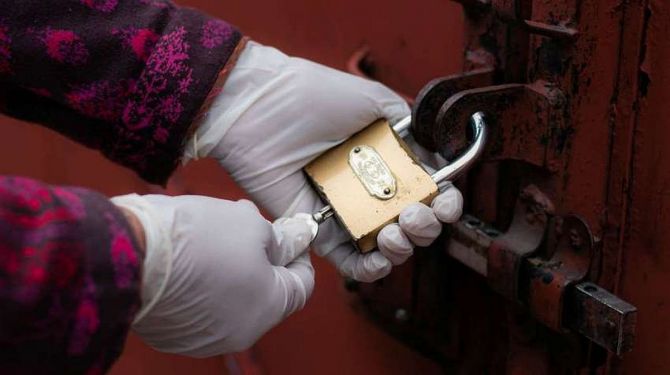'When there is unlocking, there is demand revival.'
'This is going to be the main growth engine in this kind of an economic scenario.'

State Bank of India Chairman Dinesh Khara doesn't hesitate to say that banks are probably done with rate cuts.
In conversation with Abhijit Lele and Anup Roy, Khara, bottom, says there has been a turnaround in the economy, and demand for loans is coming back.
But the bank is cautious about loan demand from vaccine manufacturers, given the huge investments which may turn sour if central approvals are not forthcoming.
Given that combating Covid requires huge capital, have you received loan requests?
We had discussions on working capital requirements of vaccine manufacturers.
Their needs are huge, but there is also an inherent risk.
Many drug manufacturers have produced vaccines in large numbers in the hope of getting approvals.
Of course, there are huge working capital requirements.
When it comes to hospitals and the health care sector, the bank has received proposals worth Rs 250-Rs 300 crore.
As for the pharmaceutical segment, Rs 1,000 crore worth proposals have already been received.
Is demand coming back in the economy?
When there is unlocking, there is demand revival.
This is going to be the main growth engine in this kind of an economic scenario.
After Covid, demand will be back with a vengeance.
Inflation rate in excess of 7 per cent is essentially attributed to the supply-side constraints.
In unlocking, the whole supply chain may not get restored in many places.
Once that adjustment process on the supply side is through, inflation, too, will go down.
Your policy expectation...
Status quo.
As far as banks are concerned, have we seen the bottoming of rates, both in terms of lending and deposit?
I think so. As far as borrowing and deposit rates are concerned, they have actually bottomed.
The only way to go up is north...
Yes, but at the same time, we're quite aware of the requirements of the economy.
We are very mindful in terms of supporting growth at this point in time.
What has been the trajectory of business?
As far as our retail loans are concerned, they grew 14 per cent.
For salaried customers, growth has been almost Rs 6,000 crore in one month, which was nearly Rs 1,000 crore more than what we had sanctioned.
When it comes to unsecured personal loans and express credit loans, we have seen significant improvement in sanctions and disbursements.
In September, in the personal loan space, we saw growth of 55 per cent year-on-year.
But disbursements went up as high as 61 per cent.
Similarly, in the home loan segment, we have had growth of 49 per cent.
We are almost two months into the one-time restructuring scheme for both corporates and retail. What is the ground situation?
We have taken stock of the special mention accounts (SMA) 1 and 2.
But we have time till March 31 for carrying on the restructuring exercise.
Internally, we are targeting at completing the restructuring to the extent of 50 per cent by December, the rest 50 per cent by February.
We are in a position to ensure all eligible accounts are restructured.
Are you seeing a lot of proposals for restructuring?
We don't see much of a challenge.
 We have given unsecured loans to customers who have been maintaining their salary accounts.
We have given unsecured loans to customers who have been maintaining their salary accounts.
They are either with the government sector, with well-rated corporate or from the public sector.
How are you ensuring your recoveries?
One, of course, is the Insolvency and Bankruptcy Code.
The others are the restructuring and the non-discretionary one-time-settlement schemes.
The colour of each would be very different.
We have also seen one major resolution going through in the early part of this quarter.
Also, there is effort on the part of all bankers to see some of the larger accounts getting resolved outside the National Company Law Tribunal.
When it comes to small accounts, we are encouraging people to come for the one-time settlement.
We have made it a liberal scheme. Hopefully, we should be able to see some good numbers by the end of this quarter.
There are many big accounts in the financial sector that are looking for resolution. But they may get delayed due to litigation.
In such cases, there is an elaborate process being laid out.
The timelines given for such kind of accounts are very, very tight. Our effort is to see there is speedy resolution.
After the Lakshmi Vilas Bank and DBS Bank merger, are we in a clear-cut path to dealing with financial firm resolutions?
The effort on the part of the regulator is to ensure the resolution happens faster in the financial sector space.
This actually ensures the perceived instability in the financial sector gets addressed well in time.
Whatever we have seen in the recent past is a departure from the earlier cases, and a welcome one at that.
This time the Reserve Bank of India has picked up a foreign bank.
So far, public sector banks (PSBs) were preferred for forced bank mergers.
This is essentially an inorganic opportunity.
Whether it would be picked up by a PSB or a private sector bank would also be guided by commercial consideration or the value such an acquisition brings.
Naturally, if at all, some bank has the ambition to scale up its distribution network, for such a foreign bank this would be a very welcome situation.
But yes, of course, there are attendant complications.
For example, the liabilities will also flow to them.
You have to evaluate the pros and cons and what you get in terms of the distribution network, against what you have now.
It's more like an ownership-agnostic effort.
It is more in terms of the value drivers, which every acquiring institution will evaluate quite critically.
After LVB's tier II bonds are deemed zero, will it be costly for you to raise funds through this route?
No. In the recent past, we have raised our tier I and tier II capital with a pricing that was set almost at the benchmark.
We were successful in raising tier I at the most competitive price, compared to our peers.
For that matter, tier II has been a success as well.
In terms of the Covid pandemic and work-from-home, are you in the process of formulating some specific policy for the long haul?
We had the work-from-home policy in 2017.
The recent pandemic has helped us leverage this policy.
We have reframed our policy to 'work from anywhere'.
In that process, we have digitised some of the non-customer-facing activities as well.
We cannot always have a work-from-home policy for everyone since we are a customer-facing organisation and need to engage with them.
What is the future of YONO? Are you still going to list it?
We are evaluating options.
When YONO was put in place, the intention was that it would be a distribution platform for the bank's products.
During the course of that we could see the value of that which it has created.
We will be sharing our definite and concrete plans in this direction soon.
How will banking change in a post-Covid world?
Some in-person meetings will probably come back once Covid is behind us.
But there will be a paradigm shift when it comes to the way we have been conducting ourselves in the past to the way we will conduct in the future.












 © 2025
© 2025